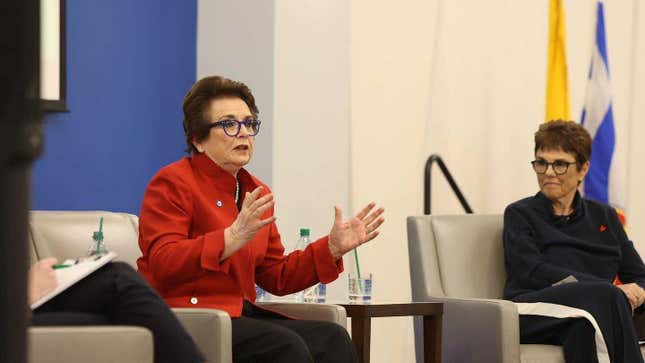
Billie Jean King and Ilana Kloss both spoke at Seton Hall University last week. The discussion kept coming back to money — from the one dollar that started the WTA Tour back in 1970, to the $50 million to buy a National Women’s Soccer League team, to the ratings for live women’s sports that keep going up.
King has lived long enough at the ledge of change to become a historian. And so my first question was, after so many moments that felt like true change, is this it? Are we there?
And to that point, ESPN just announced that the NCAA women’s basketball championship would, for the first time, be on ABC with its pregame show. And this would have been progress in 2010, but now it’s just the utter fatigue at how late these trains are rolling into the station.
The moment feels a bit turbulent. As much forward motion as there is, the men’s and women’s national soccer teams both renegotiated contracts so they could be paid equally, there is always an undertow. Right now a heavy negotiation is taking place on the idea of gender and sports. Women who carved out spaces for women from unwilling governing bodies are trying to guard that space against changing ideas of gender. Other voices raise the question of why all our sports are segregated by gender and not skill set or interest. Then you have Florida, where actual proposals would have girls report their menstrual cycles to the state as though that were some sort of definitive marker of womanhood.
Mia Brett had a smart column yesterday on how these misguided policies to enforce gender would be way more damaging to players than including the rare transgender soccer player.
Some background
For those who don’t know their history, King started a league called World TeamTennis and Kloss was its long-serving CEO. Each team — Philadelphia Freedoms was one if you’re an Elton John fan — had an equal number of men and women play to contribute to the final score. So, a set of women’s singles and doubles, men’s singles and doubles, and then mixed doubles. Big names played. For example, Venus Williams and Martina Hingis played in the aughts for a team in Mamaroneck, N.Y.
The league had its moments but never broke through, although this week the New York Times had a front-page story about Korfball, a Dutch league, and the revolutionary concept of a co-ed professional league.
Fans want to see more women’s sports
A Seton Hall poll through the Stillman School of Sports Management commissioned to coincide with King and Kloss’ visit found that Americans are interested in watching more sports. The poll found that 50 percent of the general population, 60 percent of self-described sports fans, and 66 percent of avid fans want to see more women’s sports. And among the general population, the enthusiasm was roughly equal among women and men who responded. (Full disclosure, I’m the executive director of the Seton Hall Center for Sports Media.)
So what’s standing between fans and that interest? It’s not just theoretical, it’s glimpsed in the ratings for the USWNT and the social media followings for women who play professionally. Marketers are starting to recognize the followings so many of these athletes have, and design campaigns around them. You couldn’t get away from Serena Williams during the Super Bowl commercials if you’d tried.
King addressed the key issue when she noted that people get comfortable with the way things have been done.
I often think back to what sports economist David Berry had said on the issue, that men with money love spending on sports. From team gear to stadiums to luxury suites for the company, the price tag is always reasonable. For women’s sports, that just hasn’t been the case. Even when it comes to coed play. The US Open and other Grand Slams rake in cash around those combined men’s and women’s tournaments. But that lucrative model hasn’t been widely copied even though it would be a natural for the NCAA championships, or even World Cup play.
What I’ve always appreciated about King was that she knows what the priorities are and can be bare-knuckled in communicating that. When she agreed to join us at Seton Hall, she said to me, “Jane, you should get a sponsor for this.” And she was right, and it was the encouragement I needed. And she’s provided that kind of prodding for five decades now in nearly every venture involving women and sports.
But it’s also about equity. She wanted representatives of men’s and women’s teams to meet with her, and stressed that opportunities are about everyone who wants to play sports, not one gender or another.
And when asked about the participation of transgender athletes, she stressed finding ways to include people. She recounted the moment in 1976 when the WTA accepted transgender player Renee Richards. King got pushback from other players and said, let’s have her play for two weeks and if it doesn’t work, then we move on. Within the first two days, so many people came to King to say how great Richards was to play with that she was a permanent part of the Tour.
Things have come full circle for King. Once a revolutionary, she has the perspective to show us how far women’s sports have come when so much of the progress is incremental. But when you view the change through generations, it’s been nothing short of seismic. It’s good to be reminded.